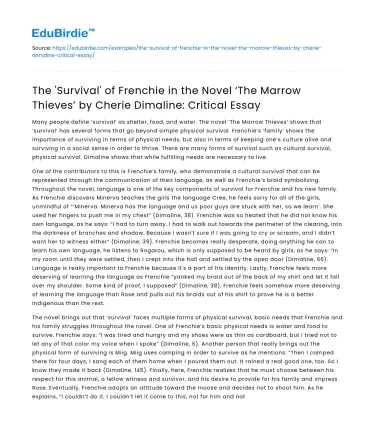Many people define ‘survival’ as shelter, food, and water. The novel ‘The Marrow Thieves’ shows that ‘survival’ has several forms that go beyond simple physical survival. Frenchie’s ‘family’ shows the importance of surviving in terms of physical needs, but also in terms of keeping one’s culture alive and surviving in a social sense in order to thrive. There are many forms of survival such as cultural survival, physical survival. Dimaline shows that while fulfilling needs are necessary to live.
One of the contributors to this is Frenchie’s family, who demonstrate a cultural survival that can be represented through the communication of their language, as well as Frenchie’s braid symbolizing. Throughout the novel, language is one of the key components of survival for Frenchie and his new family. As Frenchie discovers Minerva teaches the girls the language Cree, he feels sorry for all of the girls, unmindful of “‘Minerva. Minerva has the language and us poor guys are stuck with her, so we learn’. She used her fingers to push me in my chest” (Dimaline, 38). Frenchie was so heated that he did not know his own language, as he says: “I had to turn away. I had to walk out towards the perimeter of the clearing, into the darkness of branches and shadow. Because I wasn’t sure if I was going to cry or scream, and I didn’t want her to witness either” (Dimaline, 39). Frenchie becomes really desperate, doing anything he can to learn his own language, he listens to Rogarou, which is only supposed to be heard by girls, as he says: “In my room until they were settled, then I crept into the hall and settled by the open door (Dimaline, 66). Language is really important to Frenchie because it's a part of his identity. Lastly, Frenchie feels more deserving of learning the language as Frenchie “yanked my braid out of the back of my shirt and let it fall over my shoulder. Some kind of proof, I supposed” (Dimaline, 38). Frenchie feels somehow more deserving of learning the language than Rose and pulls out his braids out of his shirt to prove he is a better indigenous than the rest.
The novel brings out that ‘survival’ faces multiple forms of physical survival, basic needs that Frenchie and his family struggles throughout the novel. One of Frenchie’s basic physical needs is water and food to survive. Frenchie says: “I was tired and hungry and my shoes were as thin as cardboard, but I tried not to let any of that color my voice when I spoke” (Dimaline, 6). Another person that really brings out the physical form of surviving is Miig. Miig uses camping in order to survive as he mentions: “Then I camped there for four days, I sang each of them home when I poured them out. It rained a real good one, too. So I know they made it back (Dimaline, 145). Finally, here, Frenchie realizes that he must choose between his respect for this animal, a fellow witness and survivor, and his desire to provide for his family and impress Rose. Eventually, Frenchie adopts an attitude toward the moose and decides not to shoot him. As he explains, “I couldn’t do it. I couldn’t let it come to this, not for him and not for me” (Dimaline, 50). Therefore, this novel brings out several ways of physical survival.
Family is lead to survival in the novel. Which relates to sacrifice as well as support, which many of the individuals need. The author captures emotion when Chi-boy says: “Sometimes you risk everything for a life worth living, even if you’re not the one that’ll be alive to live it” (Dimaline, 152). Minerva takes down the ladder so recruiters would not see her, therefore, sacrificing herself and risking her life. It is clear when Miig mentions: “We’ve survived this before. We will survive it again. Trust that there is always someone who has taken the greater good as mission” (Dimaline, 33). Miig support to Frenchie and saying we have his back through rough times. Sacrificed and support takes a big impact on this novel.






 Stuck on your essay?
Stuck on your essay?

